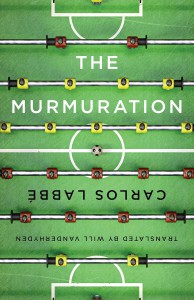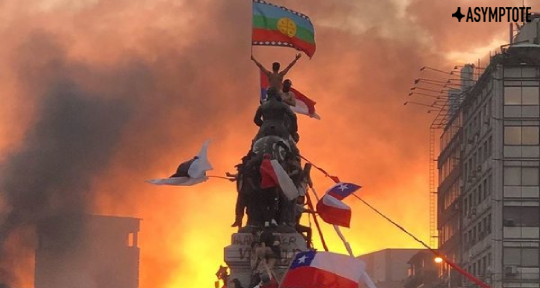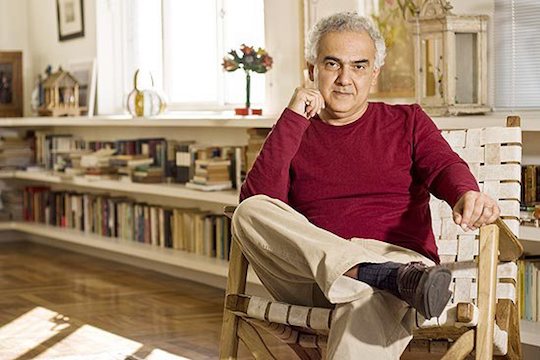Tim Benjamin continues his exposition of the collaboration between revolution and poetics in the work of Chile’s notorious antipoet, Nicanor Parra. In Liz Werner’s witty translation of his verse in the brazenly titled Antipoems: How to Look Better & Feel Great, cynicism, humor, silences, and brutal critique manifest in turns; the deep truths are gathered and reckoned with in the spaces where they collide. Read the first part of this essay here.
Revolts have their actual front lines, of course, and in the case of Chile, these were the columns of students, artists, and veterans of the “Penguin” movements of the early 2000s advancing toward increasingly hostile, increasingly anxious walls of police and military forces employing tear gas and rubber bullets. Recently back in Santiago, after the plebiscite had already been decided, a Colombian friend of mine gave me a tour of the uprising’s hot spots, where he went each evening in solidarity with his adopted country’s awakening. He described scenes of shifting pockets of absolute chaos which had popped up here and there, before dispersing with the wafting, seemingly intentional clouds of tear gas and booms of deterrent rounds. Walking down Alameda Ave, he pointed out to me all the landmarks that were forced to close during the uprising. That afternoon, he and I attended one of the Friday protests, which have continued to this day; as we walked down an Alameda Ave closed off to traffic, I noticed the small crush of people lining the street, not doing much except being there—in conversation with friends, smoking, or staring south to where, before a small plaza, a scuffle began. It wasn’t long before the gas came in one expansive burst, and the people in front of the plaza began to disperse. We thought we were far enough away, but a breeze brought us the invisibly searing burn—and a series of Good Samaritans hopping to with spray bottles of sodium bicarbonate and lemon juice, offering temporary relief. “You get used to it,” my friend said, as we turned back toward Lastarria and its street vendors and mid-scale restaurants. “You build up a tolerance.” And for some reason, through the sandpaper-burn in our cheeks and eyelids, we laughed at this. I don’t know why. I couldn’t imagine getting “used to it.”
Somehow, though, the pain felt justified—the concrete consequence giving body to a concept which I was only partly cognizant of. But it wasn’t the kind of pain that gives legitimacy to criticisms of the government, whose force (normally) seeks justification even after the fact. In other words, it wasn’t a political pain, which is reserved, fair or not, for the majority who hang back from the clashes, repeating the language of revolt that the front line incarnates. After the country’s President, Sebastian Piñera, declared the country “at war” with itself, other friends I spoke with said they would work during the day and go directly to Santiago’s main square after getting off every night, and it was these rear-guard protests that increasingly took on an air of intense jubilation—veritable revolutionary parties in streets fogged in tear gas and the volleying booms of urban warfare, as if the certainty of the success of the cause was enough to start the celebrations a priori. The reaction of those in charge were typically evasive, or offensive. One government minister casually suggested that instead of revolting in the streets, people should wake up early to avoid the increase in public transportation fares; others suggested “alien agents” descending on the country to induce chaos, which social media and protest signage quickly meme-ified.
While lack of shame and self-awareness is the realized utopia of the modern politician, it seems the uprising’s jubilance shared in Parra’s strangely unpretentious counter-narrative to it. More than a few of his poems might work as semi-mystical memes; take the poem “No president’s statue escapes,” whose three verses follow from the title to form a simple, declarative meditation on history’s losing struggle with time: From those infallible pigeons / Clara Sandoval tells us. / Those pigeons know exactly what they’re doing. Both the pigeons and the topless protesters straddling these same statues are definitive symbols of the “certainty” mentioned above, both moving into that rare space where parody becomes something more eternal than mockery.
READ MORE…




